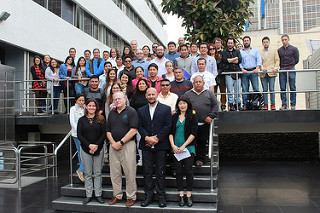Multi-faceted approach to protecting endangered southern right whales
in the eastern South Pacific.
The IWC has made important progress in efforts to protect an endangered population of southern right whales in the eastern South Pacific. The work falls under a Conservation Management Plan (CMP) and includes a new acoustic monitoring programme, the signing of a Memorandum of Understanding, and training in entanglement and strandings response.
The southern right whale population off the coasts of Chile and Peru is believed to number less than 50 mature animals. The region is understood to include important breeding areas, but more information is needed to pinpoint their location and ensure conservation measures are as targeted and effective as possible.
In 2012, the IWC endorsed a CMP for this population of southern right whales. The CMP concept was introduced by the IWC to provide national, regional and local stakeholders with a flexible tool that consolidates the best available science and management expertise, and can be tailored to meet individual circumstances. Four CMPs are currently in operation around the world and for some of the most vulnerable cetacean populations.
The first of three recent developments in this CMP is a new acoustic monitoring programme. One hydrophone was deployed last Summer and is already transmitting valuable data. Two sites per year will be selected and, over a four year timeframe, its hoped the devices will enable accurate mapping of the whales’ breeding grounds.
Another significant development in this CMP is the signing of a Memorandum of Understanding between the governments of Chile and Peru. This high level expression of commitment and co-operation highlights the importance of capacity building and sharing of knowledge, experience and data. As a formal, bi-national declaration this will underpin the other strands of work as the CMP moves forward.
One of these strands is entanglement response training. Entanglement in fishing gear has been identified as a major obstacle to the recovery of most endangered cetacean populations, and three training workshops have now been conducted in this region, the most recent in November 2018 in Lima, Peru. Reflecting the success of the IWC’s entanglement response capacity building programme, IWC’s expert and programme co-ordinator was supported by a former trainee and IWC apprentice, now national trainer for Chile, Mauricio Ulloa.
The Lima workshop was also extended to incorporate training in strandings response. This included necropsy for small cetaceans (dolphins and porpoises) using carcasses obtained in northern Peru. The highly productive but immense and often remote coastlines of Chile and Peru represent a significant challenge to systematic monitoring of stranded cetaceans. Dr. Mauricio Seguel of the University of Georgia, and Mauricio Ulloa of Sernapesca, were enlisted to conduct the stranding training.
The Peruvian Marine Research Institute (IMARPE) hosted and organised the Lima workshop, as well as providing the vessels used in the disentanglement training. The workshop was attended by nearly 60 participants from 5 countries, including veterinarians, biologists, fishery and other government department representatives, and personnel from non-governmental organisations and universities with experience working with marine mammals in the region.
The first two days were conducted in the classroom, as well as outdoors (on land). These sessions were followed by one day on the water, using four vessels and two trainers. Necropsies were held in the Mammal Autopsy Laboratory of San Marcos University. Participants were also reminded that the IWC operates expert groups for entanglement, stranding and cetacean disease, and that these groups are always available to provide advice and share information.
In addition to IWC funds, the workshop was generously supported by the Permanent Commission of the South Pacific, and contributions from Cetacean Society International (CSI) and World Animal Protection (WAP), as well as logistical and in-kind support from Centro de Conservación Cetacea (CCC) and Center for Coastal Studies (CCS).
To read more about the CMP for southern right whales click here.
Click here for general information about CMPs .
For more information about entanglement and the IWC’s Global Entanglement Response Network click here.
For more information about stranding, click here.

